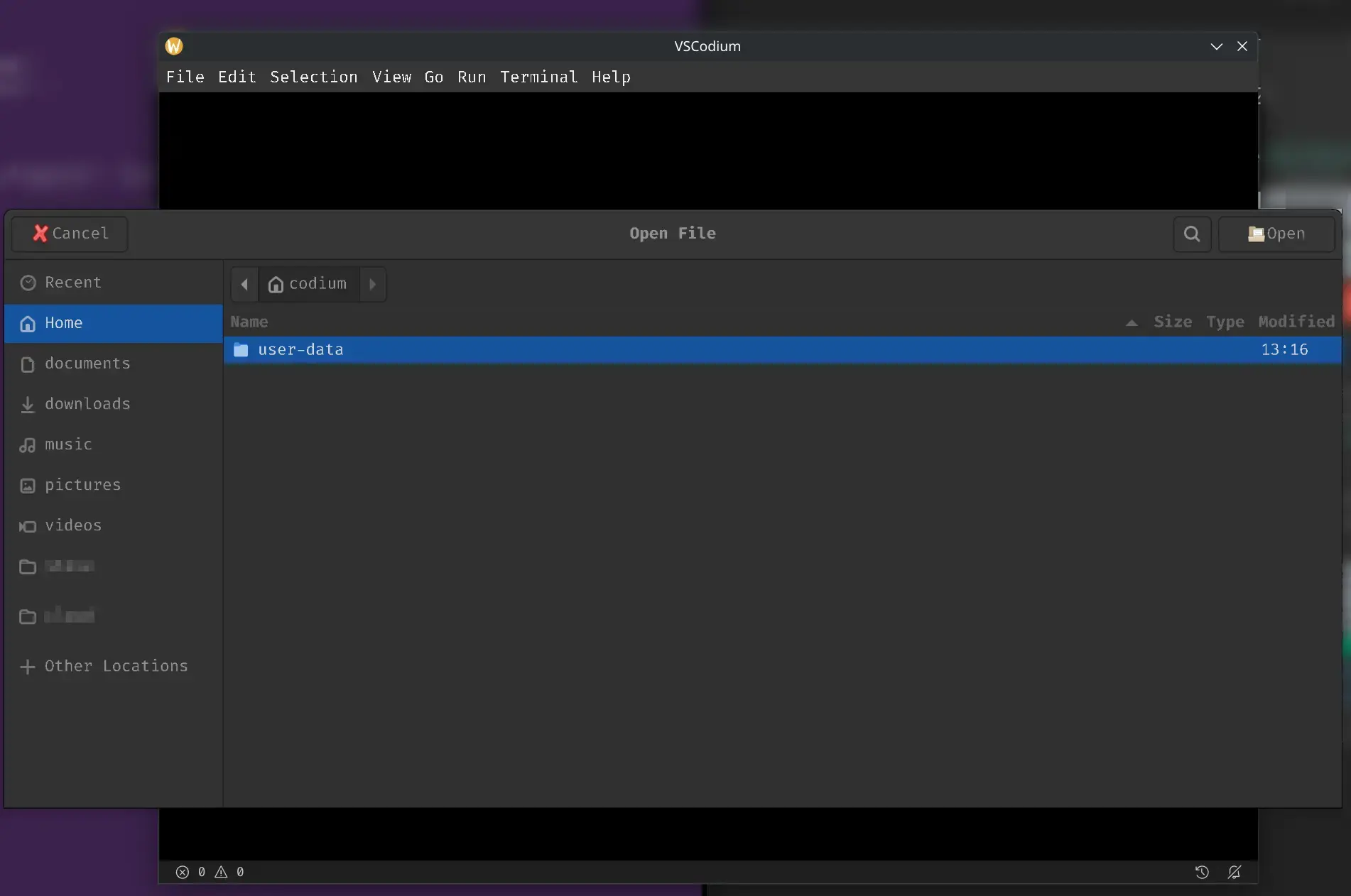I spent the morning trying to work out why all the Electron applications on my desktop (vscodium, the Signal client …) were once-a-fuc•ing-gain showing me clunky, foreign file-open and file-save dialogues (presumably from gtk) instead of correctly showing KDE’s dialogues via the very-cursed XDG-desktop-portal mechanism.
I’m on Gentoo. Had I, perhaps, broken something?
Nope. It’s just yet another regression up-stream, in Electron:
- https://github.com/microsoft/vscode/issues/231173#issuecomment-2410885232
- https://github.com/electron/electron/issues/43819#issuecomment-2379445244
- https://github.com/flatpak/xdg-desktop-portal/issues/1445#issuecomment-2379375660
- https://github.com/flathub/org.signal.Signal/issues/719
Once again, despite knowing that nobody has support for something because that thing has not been released as stable at all, yet, the whole Electron stack follows the belief that it’s perfectly OK to release a change that depends on that thing and, without it, breaks every KDE user’s desktop integration.
Then they blame it on xdg-desktop-portal not having released, yet. And won’t roll the change back because December is their “quiet month” – neither will they fix it nor make a work-around, seemingly.
Anyway. Writing this post has served to exhaust my ire. One day, we’ll see the back of Electron for good – I can only hope!
Let it also serve as a PSA: don’t bother trying to work out if you’ve accidentally broken something on your Linux desktop – particularly if you’re on Gentoo, Arch, Slackware or other hacker-friendly distribution. It’s not you. It’s not your system. It’s just fuc•ing Electron – again!
I feel kind of bad for the one responsible developer replying to all those issues. She’s taking a lot of heat, lol
It is understandable people are frustrated, I am frustrated, and joined several conversation regarding this problem. However, I don’t appreciate some of the rant from many users. This change is certainly out-of-touch, potentially due to them don’t quite foresee the amount of flatpak/kde users who are affected by this change.
But many complaints have been dangerously close to the line, if not over the line. Their quiet month policy is reasonable IMO, developers need breaks, especially those interacts frequently with the community. Love or hate electron (same apply to CEF), these works clearly bring many wonderful apps into the linux world.
I personally don’t believe that non-contributors have the right to demand free work from the electron developers.
It seems like a lot of people who do that don’t understand that there’s an inverse relationship between devs soaking up all the emotional labor that comes with being the target of end users’ ire and having the energy to get the actual work done. Especially when it comes to open source stuff, they could literally be spending the time they’re spending shouting at a dev to do more dev things like… learning to fix it themselves and submitting a commit.
I don’t see it as a “lol” matter.
The Electron project made an extremely stupid decision. Individual people who are left to wrangle with the fall-out and manage the PR have nothing but my utmost sympathy, as do all the down-stream projects (Signal, Discord, VSCodium…) who have to do the same. Even the developers of
xdg-desktop-portalare facing unnecessary backlash because of this. Their release schedule and time-line for whenorg.freedesktop.portal.FileChooserv. 4 could be reliably expected to exist in the wild was surely not kept in secret!I rescind my lol
Can you link the thread? I can’t find their response to the issue.
https://github.com/electron/electron/issues/43819#issuecomment-2379445244
look for user codebytere
Ahh, thank you. The issue seems to be that firefox didnt load any comments at all. Im seeing them in chrome now.
Thanks for the PSA, I was about to go on a troubleshooting spree with Discord not using KDE’s file picker
To lighten the mood, here’s a screenshot of one of the lowest points I achieved while hacking away, trying to resolve the issue:
 What even is going on, there?
What even is going on, there?- pixelated menu
- “Cancel” button at the top left??
- “Open” button at the top right??
- clearly Adwaita but not actually Adwaita as configured – the VSCodium window (behind) shows how Adwaita is actually configured on my system and that’s how all native gtk applications actually draw.
But isn’t that the new gtk adwaita file chooser? I kinda dislike how those action buttons in dialogs are in the headerbar now but that’s now just how it is.
See Gimp 3.0.
The new Gnome file chooser is part of Gnome’s Files app and I doubt OP has that installed when they’re using KDE Plasma. Aside from that, I’m also pretty sure this is the default GTK file chooser (so the old one) from the way it looks. For context, I use Gnome.
because electron is rubbish and there’s zero reason to use it.
An alternative for it has been steadily developing and it’s rather nice
What’s the alternative?
Tauri, it’s got awful Linux support (dated theme) but it’s improving
Its what I use for the gui of my map making software
Doesn’t it only support rust at the moment ? Is Python support on the way ?
Another example of Microsoft using its control of FOSS projects to push you towards their web-based alternatives of something you already have except now for the low low price of a monthly subscription fee, AI slop, and all ur data.
Microsoft controls electron?
Microsoft controls github which controls electron.
As much as I like to shit on Microsoft, that is not how this works. Github doesn’t magically control the projects hosted on it.
Thats not what i mean. Microsoft owns github, github who created electron.
What’s your source for that? I’ve never heard it before
From memory but wikepedia back me up: https://en.wikipedia.org/wiki/Electron_(software_framework)
I was technicaly correct in Github created it but they nolonger maintain it so idk what control they still have over the project.
It’s currently maintained by OpenJS Foundation with founding members included Google, Microsoft, IBM, PayPal, GoDaddy, and Joyent. https://en.wikipedia.org/wiki/OpenJS_Foundation
I feel one of the hardship for Linux to catch on is the lack of commercial interest to make it usable for consumers.
If this problem happened on Windows and macOS, MS and Apple would just send an engineer to spend a week or a day to have it fixed. This change has been in electron for months, and no one bother to fix it.
Same with bugs in chrome and libsecrate, which have been open for 4 freaking years… https://gitlab.gnome.org/GNOME/libsecret/-/issues/49
It also took chrome half a decade to support text-input-v3: https://issues.chromium.org/issues/40113488#comment1, which is added by a third party developer. And it still breaks KDE’s implementate https://bugs.kde.org/show_bug.cgi?id=492225 …
This kind of stuff made me stop using Linux as a desktop. It just doesn’t have the developer support it needs.
Why did your distro update those Electron apps, if they have unsatisfied dependencies?
The apps are Flatpak’ed, so they update independently of the system.
But yeah why did Flatpak update them when Flatpak has unsatisfied dependencies? (To be fair the apps still work, it’s mostly a ergonomic and cosmetic regression)
This doesn’t only affect Flatpak apps. The
xdg-desktop-portalmechanism is used by many things. Even “gtk native” applications like Firefox use it when running on a correctly configured KDE environment and one of the nuances of this issue is that those applications – today – continue to work perfectly. Electron is not part of their stack.I have
flatpakon my desktop just for Steam and even flatpak’d steam still seems to work, correctly.
It’s a good question for the package maintainers.
In their defence: it isn’t a direct dependency, it isn’t advertised, and it is likely that the distro package maintainers just don’t know about it – Electron hardly announce that they chose to depend on something that they know isn’t released, anywhere, yet, and won’t be for months.
I use as few Electron apps as possible. I replaced VSCode with (depending on what I’m trying to achieve) Helix, Sublime Text or a JetBrains IDE.
KDE’s built-in editor, Kate, is quite capable, too.
Kate has excellent lsp support nowadays as well.
Try intellij. It’s really neat and not built on electron.
This doesn’t solve the underlying issue, but if my primary code writing interface was doing this type of shit, I would ditch it immediately.
So these things always get me confused because I swear there was a neat electron thing in the single digit two thousands that was a small project and really cool and I keep on expecting this to be the grown up version but when I look it up they seem to have nothing to do with each other. I can’t even find the thing I remember from early in the millenium.
If Emmet/keymapping is important, then https://zed.dev/ is the only editor that matches VSCodium as far as I know.
Zed is very interesting. I know it.
Very recently, I found a fork of Zed that gutted the AI Assistant integration and Telemetry. I forked that, myself, and took it further: gutting automatic updates, paid feature-gating, downloading of executable binaries and runtimes like Node.js (for extensions that don’t compile to WASI), integration with their online services, voice-calling, screen sharing, etc.
My branch ended up down 140 000 lines[1] of code and up less than 300! It was educational and the outcome was absolutely brilliant, to be fair. In all honesty, forking it and engaging in this experiment took less than 24 hours even though I restarted three times, with different levels of “stringency” in my quest.
This experiment was very realisable. Forking Zed and hacking on it was quite possible – the same cannot be said for just “forking Electron” or “forking VS Code” or even getting up to speed on those projects to the point of being able to fix the underlying issues (like this OP) and submit merge-requests to those projects. They have a degree of inscrutability that I absolutely could overcome but would not, unless I was paid to at my usual rates. (I have two decades of professional development experience.)
I shelved the effort – for the time being – for a few reasons I don’t particularly want to extenuate, today, but I shall continue to follow Zed very closely and I truly, deeply hope that there is a future in which I see hope (and, thus, motivation) in maintaining a ready-to-go, batteries-included, AI-free, telemetry-free, cloud-free fork.
Part of maintaining a fork would include sending merge-requests upstream even though I should hardly expect that my fork would be viewed favourably by the Zed business. But, from what I can tell, Zed seem to act true to the open-source principles – unlike many other corporate owners of open-source projects – and I see no reason (yet) to believe they would play unfairly.
No word of a lie! The upstream repo is well over 20k commits and over 100 MB in volume. Zed is not a nice, small, simple code-base: it is VAST and a huge percentage of that is simply uninteresting to me. ↩︎
Why not use KDevelop or Kate?














